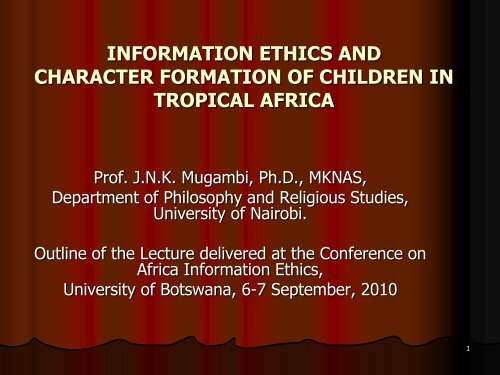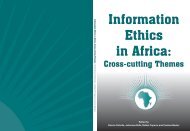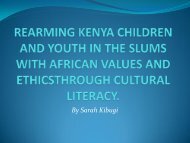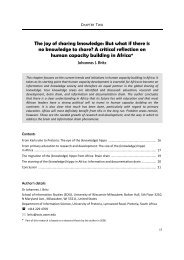JNK Mugambi - Africa Information Ethics Portal
JNK Mugambi - Africa Information Ethics Portal
JNK Mugambi - Africa Information Ethics Portal
Create successful ePaper yourself
Turn your PDF publications into a flip-book with our unique Google optimized e-Paper software.
INFORMATION ETHICS AND<br />
CHARACTER FORMATION OF CHILDREN IN<br />
TROPICAL AFRICA<br />
Prof. J.N.K. <strong>Mugambi</strong>, Ph.D., MKNAS,<br />
Department of Philosophy and Religious Studies,<br />
University of Nairobi.<br />
Outline of the Lecture delivered at the Conference on<br />
<strong>Africa</strong> <strong>Information</strong> <strong>Ethics</strong>,<br />
University of Botswana, 6-7 September, 2010<br />
1
PROBLEMS OF MEANING IN ACADEMIC AND<br />
PROFESSIONAL DISCOURSES<br />
• Language is a cultural product, which is designed as the<br />
primary carrier of a community’s world-view. Meaning is<br />
embedded in language.<br />
• As a result of our history we in <strong>Africa</strong> have been preconditioned<br />
into five linguistic commonwealths – English, French,<br />
Portuguese, Arabic and Spanish.<br />
• For the majority of <strong>Africa</strong>ns the language of nurture is not the<br />
language of schooling and governance.<br />
• The language in which a child learns to be a human being is<br />
not the one in which he or she learns to become a citizen.<br />
• We need therefore to ask ourselves how the concepts we<br />
deliberate about in this conference can be understood and<br />
appreciated in the various cultural and linguistic contexts.<br />
2
SETTING THE CONTEXT<br />
• Early in September 2010 BBC reported that the Government of Sweden has<br />
prohibited the screening of the Hollywood-produced 3D cartoon film Cats<br />
and Dogs on Swedish Television to children below seven years of age, on<br />
the ground that such children will be adversely affected by the cartoon film.<br />
Freedom of the media, and freedom of information must not adversely<br />
affect any segment of a national population. In this case of Sweden, the<br />
Government has decided. Will UNESCO, or any of the other UN agencies<br />
challenge the decision? Will the producers and promoters of the cartoon<br />
challenge it? If not, does it set a precedent for <strong>Africa</strong>n governments to<br />
prohibit the screening of any movies which are detriment to the moral<br />
formation of their children and youth?<br />
• Each of you will remember messages from your teachers, parents, peers<br />
and broadcasters which had a memorable impact on your lives. At the end<br />
of my address I invite each of you to share with us the specifics of these<br />
incidents. Personally I have many such incidents, which could fill a whole<br />
book. Those incidents and messages have partly made me the person I am<br />
today, through example or by default! Children and youth in <strong>Africa</strong> today are<br />
profoundly affected by the messages they receive at home, in school, at the<br />
church and mosque, or on radio and television. Whatever messages are<br />
passed on to children and youth should be a matter of serious ethical<br />
concern.<br />
3
CONCEPTUAL CLARIFICATIONS:<br />
KNOWLEDGE AND INFORMATION<br />
• The word “information” refers to a collection of “data”<br />
about a specific topic.<br />
• The compiler of “information” decides what data to put<br />
together.<br />
• Criteria for compilation of “data” into “information” are<br />
arbitrary.<br />
• A piece of “<strong>Information</strong>” becomes “knowledge” when it<br />
is incorporated and related with other pieces of<br />
information leading someone to an opinion or a<br />
perspective.<br />
• “<strong>Information</strong>” does not become “knowledge” until it is<br />
processed in within a person’s consciousness.<br />
4
CONCEPTUAL CLARIFICATIONS:<br />
KNOWLEDGE AS PROCESSED INFORMATION<br />
• “Knowing” means interpreting the “information” which someone has<br />
received through the senses or through other channels.<br />
• Deriving “knowledge” from “information” is a cultural process.<br />
• Knowledge accumulation is a cultural process, consisting of<br />
cognitive, affective and practical functions.<br />
• The ability to accumulate knowledge has to be cultivated in the<br />
process of upbringing of children.<br />
• The nurture of children determines how they process information<br />
into knowledge.<br />
• The information to which children are exposed determines the kind<br />
of knowledge they begin to accumulate, and the attitudes they<br />
develop as they grow up.<br />
• Parenthood includes the responsibility to provide an environment for<br />
the offspring to develop conceptual tools for the processing of<br />
information into knowledge.<br />
• The State has interest in the way parents bring up their children.<br />
Hence the interest of states in the character formation of youth.<br />
5
WHO SHAPES A CHILD’S VALUES?<br />
PARENTS?<br />
ADVERTS?<br />
AYAHS?<br />
MEDIA?<br />
THE<br />
CHILD<br />
SIBLINGS?<br />
PEERS?<br />
PREACHERS?<br />
TEACHERS?<br />
6
VARIABLES IN CHARACTER FORMATION<br />
HOME<br />
SOCIETY<br />
SCHOOL<br />
COLLEGE<br />
PEER<br />
GROUPS<br />
CHARACTER<br />
CHURCH<br />
TEMPLE<br />
MOSQUE<br />
SHRINE<br />
INTERNET<br />
MOBILE PHONE<br />
ADVERTISING<br />
RADIO<br />
TELEVISION<br />
VIDEO<br />
7
TELEVISION CHANNELS<br />
JEZ<br />
KBC<br />
KTN<br />
BBC<br />
NTV<br />
CNN<br />
TV<br />
CTV<br />
EATV<br />
K24<br />
CLASS<br />
KAM<br />
STV<br />
8
TELEVISION CONTENT<br />
• Daily After School: Cartoons: Popeye; Tom<br />
& Jerry; Stanley and Alley; Scooby; Walt<br />
Disney; Muppet Show; Cats and Dogs;. . .<br />
• Weekend Afternoons: Old Cowboy movies;<br />
Old Wild West Movies.<br />
• Weekend Evenings: Pop Music; Soap<br />
operas.<br />
• Monday Evenings: Wrestling.<br />
9
SHAPERS OF CHILDREN’S VALUES:<br />
AFRICA AND THE NORTH ATLANTIC<br />
TROPICAL AFRICA<br />
• Age 1-3: Most time spent with<br />
Ayah.<br />
• Age 3-6: Most with<br />
Kindergarten teachers.<br />
• Age 7-14: Most time with<br />
primary school teachers<br />
• Age 15-18: Most time with<br />
teachers and peers.<br />
• Age 19-25 Most time with<br />
peers & Media.<br />
• 90% of Radio & TV content is<br />
foreign.<br />
• 99.9% of Internet is foreign<br />
NORTH ATLANTIC<br />
• Age 1-3: Most time with<br />
Mother.<br />
• Age 3-6: Most time with<br />
Mother.<br />
• Age 7-14: Most time with<br />
professionals.<br />
• Age 15-18: Most time with<br />
professionals.<br />
• Age 19-25 Most time with<br />
professionals.<br />
• 100% of Radio & TV content is<br />
local<br />
• 99.9% of Internet is local.<br />
10
VALUES AND VIRTUES IN THE<br />
BROADCAST MEDIA CHANNELS<br />
COMPETITION<br />
INADEQUACY<br />
INDIVIDUALISM<br />
MEDIA BASED<br />
VIRTUES<br />
IMPORTS<br />
VIOLENCE<br />
CONSUMERISM<br />
11
THE CULTURAL FOUNDATIONS OF<br />
APPLIED ETHICS<br />
P<br />
OUR DAILY PRACTICES<br />
NORM<br />
ATTITUDE<br />
PRINCIPLE<br />
VALUES<br />
ETHIC<br />
ETHOS<br />
OUR NORMS<br />
OUR ATTITUDES<br />
OUR PRINCIPLES<br />
OUR VALUES<br />
OUR ETHIC<br />
OUR ETHOS<br />
WORLD VIEW<br />
OUR WORLDVIEW<br />
12
WORLD-VIEWS AND PERSONAL DISPOSITIONS<br />
• Our Word-view determines our self-understanding.<br />
• What is our worldview? Where did we get it from?<br />
• Our World-View informs our Ethos. So, what is our Ethos? Where did it<br />
come from?<br />
• Our Ethos informs our Ethic. So, what is our Ethic? On what is it based?<br />
• Our Ethic informs our values. So what are our values? Where did we get<br />
them from?<br />
• Our Values inform our Virtues and our Vices. So what is Virtue and Vice?<br />
• Our Virtues and Vices shape our Principles. So What are our principles?<br />
• Our Principles determine our Norms. So what Norms do we cherish?<br />
• Our Norms determine our Attitudes. So what Attitudes do we encourage?<br />
• Our Attitudes condition our Daily Practices.<br />
• So how do we rationalize our daily practices? What influences our daily<br />
choices?<br />
• If we wish to reform our Daily Practices,<br />
• We must review our World-view<br />
• And go the full circle back to our Virtues and Vices<br />
• Back to our Norms and Attitudes,<br />
• Back to me and you,<br />
• Back to God who makes all things new.<br />
13
THE TEN AGES OF A PERSON<br />
Escort to the<br />
Next Life<br />
OLD AGE<br />
DEATH<br />
BIRTH<br />
BABY<br />
Welcome to<br />
the World<br />
Welcome to<br />
Elderhood<br />
Community<br />
Service<br />
MID-AGE<br />
HUMAN<br />
LIFE CYCLE<br />
INFANT<br />
Welcome to<br />
Mobility<br />
Welcome to<br />
Parenthood<br />
Initiation to<br />
Peer Groups<br />
ADULT<br />
YOUTH<br />
PUBERTY<br />
CHILD<br />
Welcome to<br />
Adulthood<br />
14
MAIN ASPECTS OF<br />
SOCIAL RESPONSIBILITY<br />
RELIGION:<br />
Sense of Belonging<br />
and Self-Definition<br />
POLITICS<br />
POLITICS: Distribution of<br />
Social Influence,<br />
Opportunities & Prerogatives<br />
RELIGION<br />
CULTURE<br />
ECONOMY<br />
ECONOMICS:<br />
Distribution of<br />
Resources and<br />
Facilities<br />
KINSHIP<br />
ETHICS<br />
ETHICS:<br />
Sense of Values,<br />
Virtues & Vices<br />
KINSHIP:<br />
Proper Relationship<br />
in Primary Groups<br />
AESTHETICS<br />
AESTHETICS:<br />
Sense of Proportion in Shapes,<br />
Sizes, Colours & Sounds<br />
15
RESPONSIBLE CITIZENSHIP<br />
PAY TAXES?<br />
HELP OTHERS?<br />
OBEY LAWS?<br />
POLITICS<br />
KEEP PEACE?<br />
WORK HARD?<br />
CONSUME<br />
WHAT YOU PRODUCE?<br />
PRODUCE<br />
WHAT YOU CONSUME?<br />
16
EXTENDED FAMILY (UJAMAA-UBUNTU)<br />
AFRICAN SENSE OF COMMUNITY<br />
PARENTS<br />
GUESTS<br />
BROTHERS &<br />
SISTERS<br />
COMMUNITY<br />
IN-LAWS<br />
UNCLES &<br />
NEPHEWS<br />
SPONSORS<br />
17
ROLE ASSIGNMENT<br />
ACCORDING TO PAUL OF TARSUS<br />
• Emperor and Aristocrats: Rule with justice,<br />
wisdom, and mercy.<br />
• Nobles: Treat inferiors kindly and with compassion.<br />
• Citizens: Consider fellow citizens, subjects, aliens and<br />
slaves as equals. (Ephesians 6: 1-9).<br />
• Aliens: Obey the laws and respect the values and<br />
norms of the Empire.<br />
• Subjects: Obey and respect the imperial laws.<br />
• Slaves: Perform your duties with self-confidence but<br />
do not subvert the status quo.<br />
18
DISTINCTION BETWEEN<br />
EQUALITY AND EQUITY (PAUL OF TARSUS)<br />
• Paul of Tarsus made a very clear conceptual<br />
distinction between Equality and Equity. In his<br />
teaching Equality is impossible in human society.<br />
• Equity is not only possible, but it is a moral necessity.<br />
• Those who are advantaged ought to relate with the<br />
disadvantaged as if they had no advantage.<br />
• The disadvantaged ought to affirm their dignity<br />
irrespective of any odds against them.<br />
19
IMPLICATIONS<br />
• Human beings are not only social beings; they<br />
are cultural beings.<br />
• Culture is made possible by communal<br />
traditions through which nature is modified for<br />
the comfort of particular communities.<br />
• These traditions include Politics, Economics,<br />
<strong>Ethics</strong>, Aesthetics, Kinship and Religion.<br />
• It is the responsibility of religious leaders to<br />
remind the community<br />
20
CONCLUDING REMARKS<br />
Two thousand years ago Paul of Tarsus wrote the<br />
following challenge in Applied <strong>Ethics</strong>, which is still<br />
valid as if uttered here today:<br />
• Finally brothers and sisters, whatever is true,<br />
whatever is honorable, whatever is just, whatever is<br />
pure, whatever is lovely, whatever is gracious, if there<br />
is any excellence, if there is anything worthy of praise,<br />
think about these things. What you have learned and<br />
received and heard and seen in me, do, and the God<br />
of peace will be with you. (Philippians 4: 8)<br />
21
CELEBRITY AND MEDIOCRITY:<br />
WHO CHOOSES? WHO DECIDES?<br />
• Whatever is honorable: What is honor?<br />
• Whatever is just: What is justice?<br />
• Whatever is pure: What is purity?<br />
• Whatever is lovely: What is loveliness?<br />
• Whatever is gracious: What is graciousness?<br />
• Whatever is excellent: What is excellence?<br />
• Whatever is praiseworthy: What is praiseworthy?<br />
• In this era of Globalization, WHO DECIDES?<br />
• Is <strong>Information</strong> Sovereignty possible today?<br />
• What is the role of state and private media channels in shaping<br />
the values of the children and the youth in <strong>Africa</strong>n nations?<br />
22
ANOTHER WORLD IS POSSIBLE<br />
• There are no easy answers to these questions.<br />
• When I travel to various countries I am interested in<br />
watching the content of TV channels.<br />
• Clearly there are subtle principles guiding those who<br />
procure the content. Profit is the greatest consideration.<br />
Sensationalism attracts viewers, and viewers attract<br />
advertisements, and advertisements attract revenue, and<br />
revenue increases profits. The bottom-line is profit.<br />
• Can there be another bottom-line other than Profit? Is<br />
another world possible?<br />
• What strategies in policy and pedagogy will make<br />
another world possible? That is your challenge and mine.<br />
23
THANK YOU<br />
FOR<br />
YOUR ATTENTION<br />
AND FOR<br />
SILENSING<br />
YOUR MOBILE PHONES<br />
24






